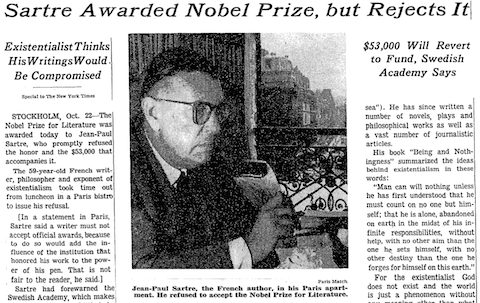Jean-Paul Sartre Rejects the Nobel Prize in Literature in 1964: “It Was Monstrous!”
In a 2013 weblog put up, the good Ursula Ok. Le Guin quotes a London Instances Literary Supplement column by a “J.C.,” who satirically professionalposes the “Jean-Paul Sartre Prize for Prize Refusal.” “Writers throughout Europe and America are fliping down awards within the hope of being nominated for a Sartre,” writes J.C., “The Sartre Prize itself has never been refused.” Sartre earned the honor of his personal prize for prize refusal by fliping down the Nobel Prize in Literature in 1964, an act Le Guin calls “characteristic of the gnarly and counter-suggestible Existentialist.” As you’ll be able to see within the quick clip above, Sartre fully believed the committee used the award to whitewash his Communist political views and activism.
However the refusal was not a theatrical or “impulsive gesture,” Sartre wrote in a statement to the Swedish press, which was later published in Le Monde. It was consistent along with his lengthystanding principles. “I’ve all the time declined official honors,” he mentioned, and referred to his rejection of the Legion of Honor in 1945 for similar reasons. Elaborating, he cited first the “personal” reason for his refusal
This attitude is predicated on my conception of the author’s enterprise. A author who adopts political, social, or literary positions should act solely with the means which can be his personal—that’s, the written phrase. All of the honors he could obtain expose his learners to a prescertain I don’t consider desirin a position. If I signal myself Jean-Paul Sartre it isn’t the identical factor as if I signal myself Jean-Paul Sartre, Nobel Prize winner.
The author should therefore refuse to let himself be transfashioned into an institution, even when this happens underneath probably the most honorin a position circumstances, as within the current case.
There was another reason as nicely, an “objective” one, Sartre wrote. In serving the reason for socialism, he hoped to result in “the peaceful coexistence of the 2 cultures, that of the East and the West.” (He refers not solely to Asia as “the East,” but additionally to “the Eastern bloc.”)
Therefore, he felt he should stay independent of institutions on both aspect: “I ought to thus be fairly as unable to just accept, for examinationple, the Lenin Prize, if someone needed to present it to me.”


As a flattering New York Instances article noted on the time, this was not the primary time a author had refused the Nobel. In 1926, George Bernard Shaw turned down the prize money, offended by the extravagant money award, which he felt was unnecessary since he already had “sufficient money for my wants.” Shaw later relented, donating the money for English translations of Swedish literature. Boris Pasternak additionally refused the award, in 1958, however this was underneath excessive duress. “If he’d tried to go settle for it,” Le Guin writes, “the Soviet Government would have immediately, enthusiastically arrested him and despatched him to eternal silence in a gulag in Siberia.”
These qualifications make Sartre the one writer to ever outproper and voluntarily reject each the Nobel Prize in Literature and its sizin a position money award. Whereas his statement to the Swedish press is full of well mannered explanations and gracious demurrals, his filmed statement above, excerpted from the 1976 documalestary Sartre by Himself, minces no phrases.
As a result of I used to be politically concerned the bourgeois establishment needed to cover up my “previous errors.” Now there’s an admission! And they also gave me the Nobel Prize. They “pardoned” me and mentioned I deserved it. It was monstrous!
Sartre was the truth is pardoned by De Gaulle 4 years after his Nobel rejection for his participation within the 1968 uprisings. “You don’t arrest Voltaire,” the French President supposedly mentioned. The author and philosopher, Le Guin factors out, “was, in fact, already an ‘institution’” on the time of the Nobel award. Nonethemuch less, she says, the gesture had actual implying. Literary awards, writes Le Guin—who herself refused a Nebula Award in 1976 (she’s gained several extra since)—can “honor a author,” during which case they’ve “genuine value.” But prizes are additionally awarded “as a marketing ploy by corpofee capitalism, and a fewinstances as a political gimmick by the awarders [….] And the extra prestigious and valued the prize the extra comprofessionalmised it’s.” Sartre, in fact, felt the identical—the higher the honor, the extra likely his work could be coopted and sanitized.
Perhaps proving his level, a brief, nasty 1965 Harvard Crimson letter had many, much less flattering issues than Le Guin to say about Sartre’s motivations, nameing him “an unsightly toad” and a “poor loser” envious of his former buddy Camus, who gained in 1957. The letter author calls Sartre’s rejection of the prize “an act of pretension” and a “moderately ineffectual and stupid gesture.” And but it did have an impact. It appears clear no less than to me that the Harvard Crimson author couldn’t stand the truth that, provided the “most coveted award” the West can bestow, and a heaping sum of money apart from, “Sartre’s huge line was, ‘Je refuse.’”
Related Content:
Jean-Paul Sartre & Albert Camus: Their Palship and the Bitter Feud That Finished It
Hear Albert Camus Deliver His Nobel Prize Acceptance Speech (1957)
Josh Jones is a author and musician primarily based in Durham, NC. Follow him at @jdmagness

